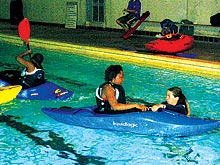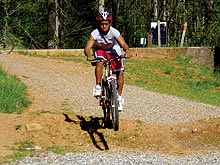According to the Boulder, Colo.-based Outdoor Industry Association, eight of 10 Americans engaging in outdoor recreational activities such as kayaking and rock climbing are white. In other words, one could presume that an African-American or Latino teen from Asheville or Charlotte would not be likely to don a PFD or climbing harness. Equipment is costly; rivers and crags are often remote. So it would make sense that minority athletes, many of whom live in urban areas, won’t engage in something they can’t see, get to or afford.

These may seem like valid barriers, but perhaps there’s more to the story. To truly grasp why there’s so little diversity among outdoor-sports participants in Western North Carolina and across the nation, one must look beyond the obvious.
“It just isn’t true that minorities aren’t interested in the outdoors,” asserts Christen McNamara, outdoor-recreation coordinator for Asheville’s Parks and Recreation Department. McNamara coordinates the local Teens Outside program—an eight-week course designed to introduce underprivileged, racially diverse teens to an outdoor, active lifestyle. Enthusiasm, she says, is not a problem. “The kids in the program keep telling us how much they love it,” she reports. “It really has been a perfect fit.”
“It really is a paradox,” says Wayne Dickert, who directs the paddling school at the Nantahala Outdoor Center. “There aren’t a lot of prejudices in the outdoors, yet you don’t see many minorities.” And the truth is that few, if any, want their sports to be exclusive. In fact, many in the industry are keen to boost minority participation, rallying to the challenge of attracting more ethnic and economic diversity.
But how do you actually do it?
According to the Outdoor Industry Association, which helped launch Teens Outside, a majority of Americans who do participate in such activities were “invited” to an active, outdoor lifestyle. And since the nation’s growing minority population doesn’t typically have a tradition of this kind of outdoor recreation in its families and communities, the likelihood of its younger members taking to the river in a boat or climbing a rock wall is slim. “Historically, the traditional paths into the outdoors are parents, schools or peers,” says Frank Hugelmeyer, the association’s president and CEO. “You need to have a mechanism by which you can get over their concerns. You need to be where they live.”
That became apparent to McNamara when she was recruiting for the newly launched Teens Outside program two years ago. “A girl asked me what a kayak was,” she recalls. “It surprised me that, in an outdoor town like Asheville, a teen wouldn’t know that.” Most program participants, McNamara points out, have never been to Bent Creek, one of the region’s best-known outdoor spots. “The opportunity has just not been there,” she says.

Consider this: Even if white water ran right through downtown Asheville, the likelihood of lower-income teens taking up paddling is probably as slim as their chances of joining a lacrosse team or swinging a tennis racquet. And the less likely someone is to identify with a particular leisure activity, the less likely they are to get involved in it. That’s especially true for teens, for whom social acceptance is vital. Kids tend to stay where they create friendships and connect with role models.
Accordingly, Teens Outside and other similar urban programs hope to become surrogate paths into these sports, thereby creating sustainable mentor chains that will invite new groups into the outdoors and help weave an ethnically and racially diverse community of paddlers, mountain bikers and climbers.
Every Friday afternoon, McNamara drives a vanload of teens to a variety of outdoor activities: to the pool for a roll clinic, to a climbing wall, or to Bent Creek to ride the trails. In time, participants can choose to pursue the activity that attracts them most.
But the story doesn’t end with developing skilled paddlers, climbers and mountain bikers. “The activities are hopefully vehicles for something greater,” notes Chad Morgan, UNCA’s interim director of campus recreation, who matches the teens in the program with student mentors. “The condition of the environment is a societal issue, regardless of race. The more folks we bring outdoors, the better chance we have to deal with those kinds of issues.”
That alone may be one of the strongest arguments for promoting the outdoors to a broad swath of society, particularly in Asheville and other urban places where it’s vital to connect more people with the value of green space, and with policies and programs supporting progress in addressing crucial local and global environmental issues. But outdoor sports can also help fight obesity, create community and help young people discover that diversity is a value many outdoors lovers share.
To be sure, there are many fine programs designed to attract minorities to outdoor sports, but retaining low-income youths who have limited access to the outdoors can be a struggle. In fact, one of Teens Outside’s greatest challenges has been finding minority mentors for program participants, because there are so few out there.
Still, both Morgan and McNamara say they’re pleased that many teens who wouldn’t otherwise have the opportunity are getting exposed to the outdoors, and they’re encouraged by these young people’s enthusiasm for the outdoors. The program has also been attracting attention farther afield: Teens Outside now serves as a model for 21 similar efforts across the country.
That’s a real achievement, but the larger question—will the program have a lasting impact—remains unanswered. “We don’t know yet,” says McNamara. “The ultimate success is if they decide to keep an active lifestyle and come out on their own.”
[Jack Igelman lives in West Asheville.]



I totally agree with Andrea Van Gunst’s responce to this article. How can you expect people of color to enjoy outdoor activities whenn they constantly run into discrimination in their everyday life. Sure,the discrimination is not as brutal anymore as the lynchings and killings of the 50’s and 60’s. But, as Shakti Butler put it: “It is not the KKK that I’m afraid of, it is the exhaustion of living with with a thousand little cuts everyday”.